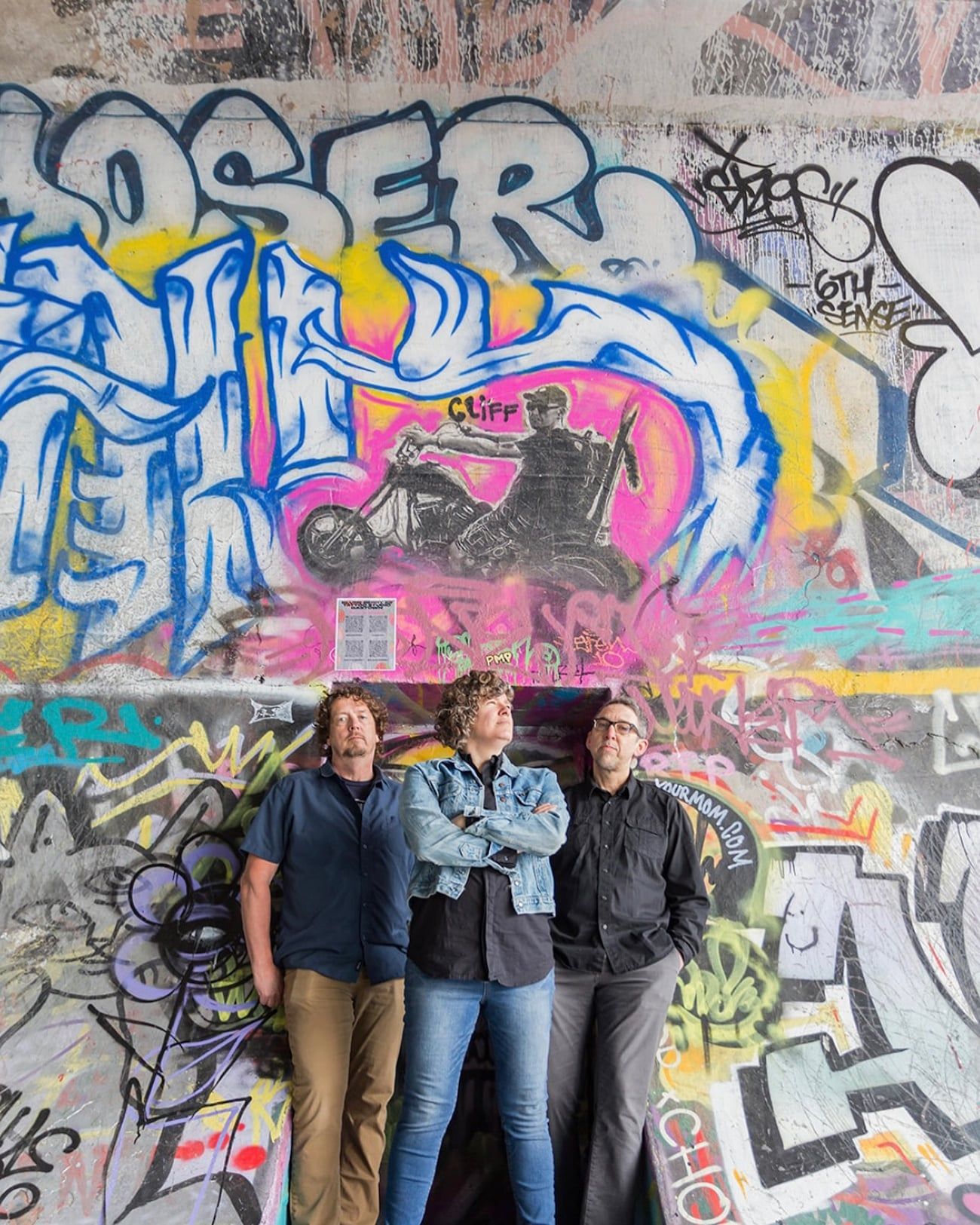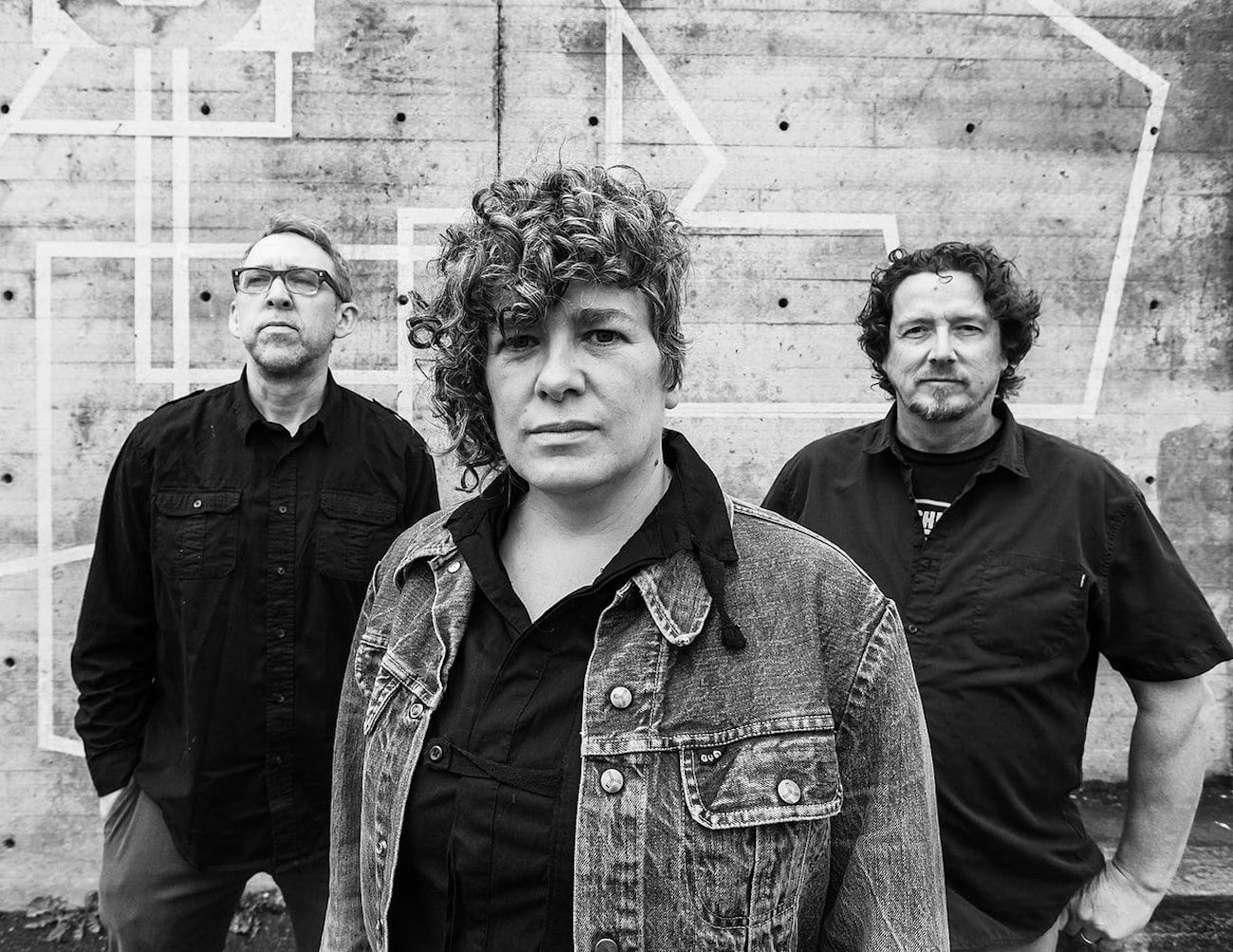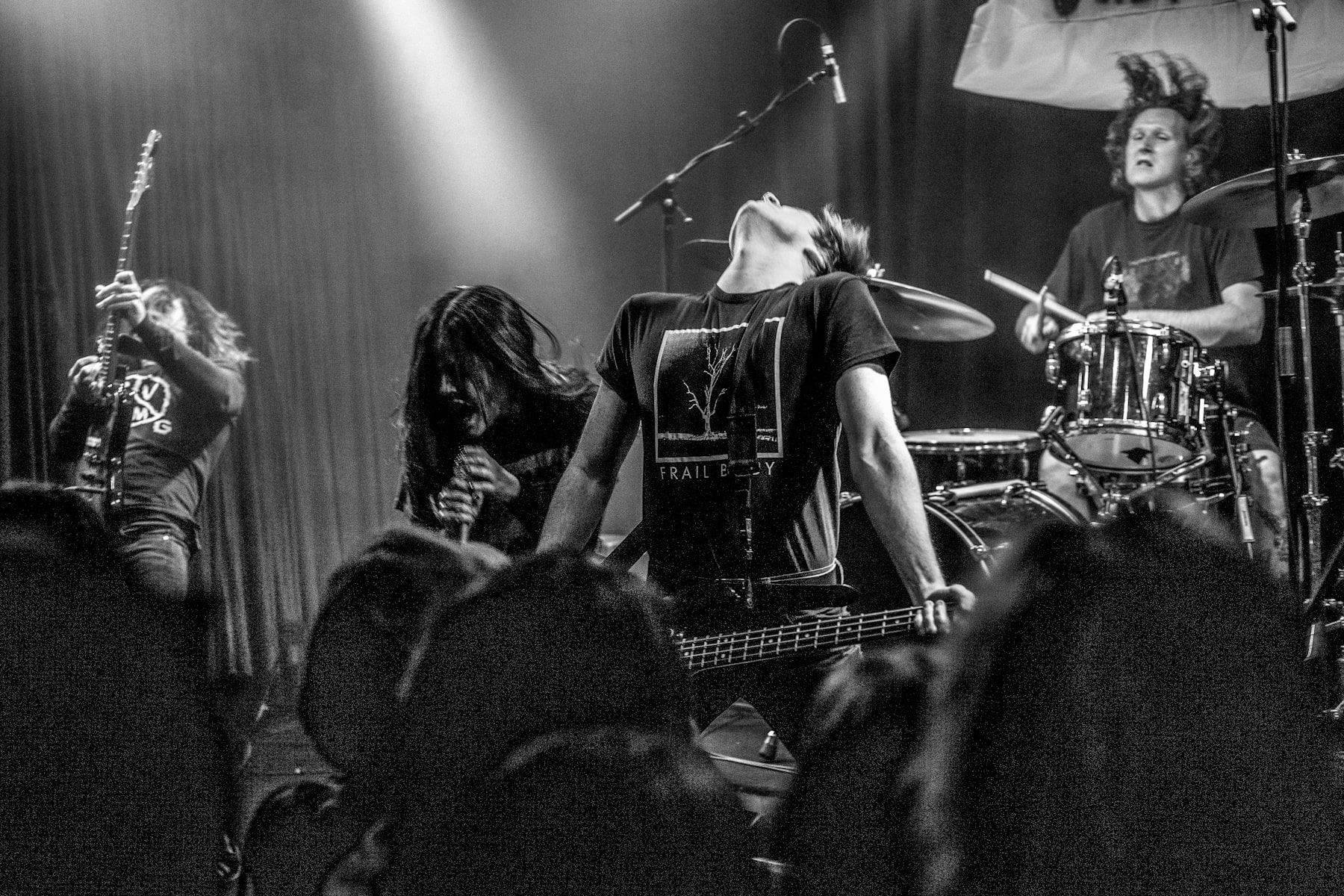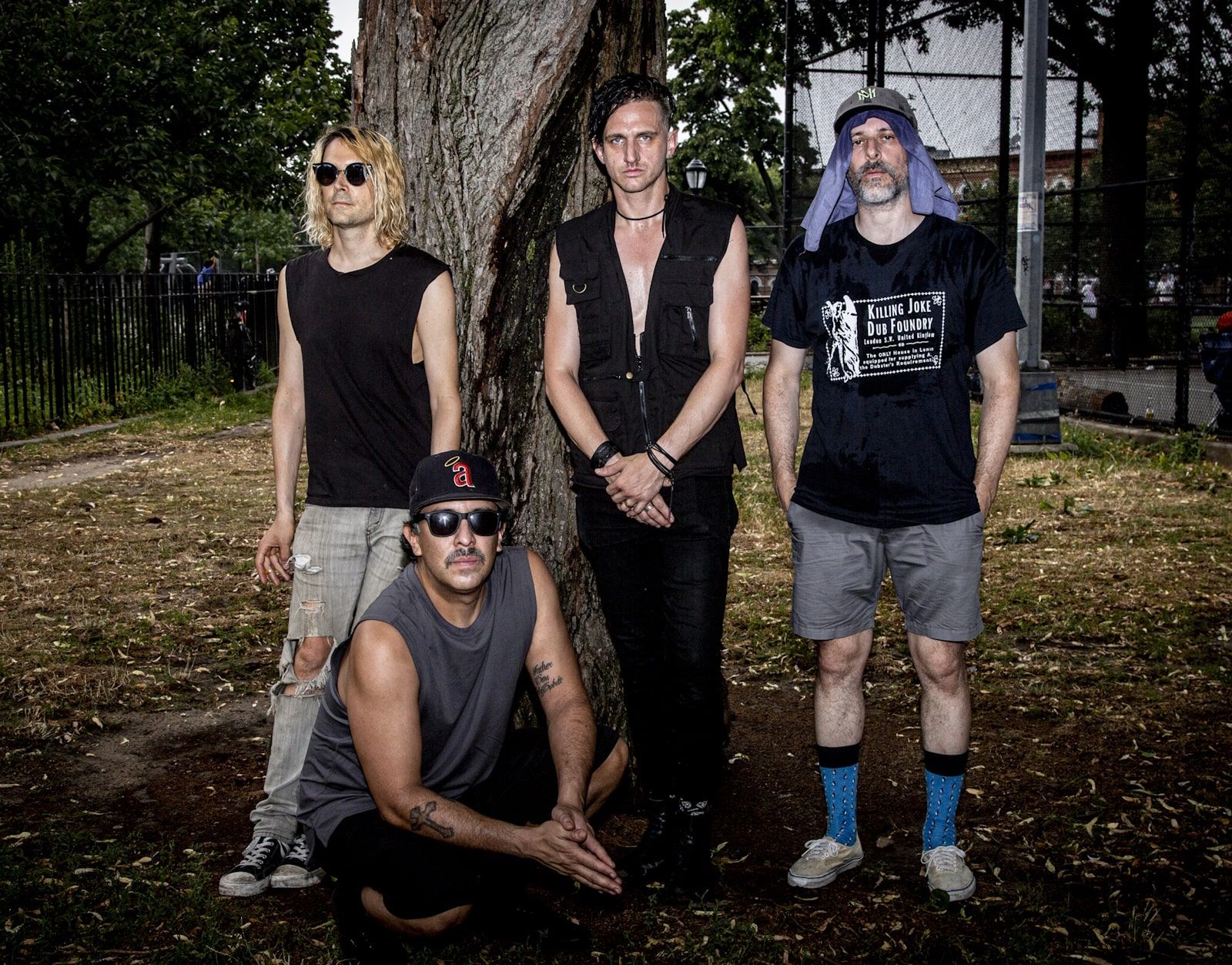From the raw, wild heart of the Okanagan Valley comes Down The Lees, a post-noise-rock trio led by the indomitable Laura Lee Schultz. This band’s journey is as untamed as the landscape they hail from, stretching from solo project days in Vancouver, through Belgian upheavals, and back to the rugged terrain of Canada. Their latest EP, “Dirt,” is an interesting, alternative and gritty proof of their tenacity. Produced by Jesse Gander at Raincity Recorders and mastered by Blake Bickel, “Dirt” captures the unpolished, visceral energy of Down The Lees, without loosing its well-thought and interestingly crafter structure.
“Dirt” digs deep into themes of environmental urgency, resilience, and the human condition. Each track is a raw, unfiltered expression of life’s brutal beauty, shaped by Schultz’s experiences across continents and upheavals. The EP begins with a whisper and erupts into a cacophony, reflecting the volatile world it was born from.
Schultz’s commentary on the tracks pulls no punches, offering a no-holds-barred look into the band’s creative process and the personal battles behind the music. It’s a gritty, unvarnished narrative that matches the band’s sonic onslaught. From the quiet intensity of environmental laments to the fierce declarations of resilience, each song is a piece of the larger picture that is “Dirt.”
Dive into Schultz’s track-by-track commentary below to uncover the stories, struggles, and triumphs that breathe life into this noteworthy record.
Catch the band live at the following shows:
07.19.24 Kelowna, BC @ Okanagan Tattoo Show
08.22.24 Kelowna, BC @ Jackknife
08.24.24 Vernon, BC @ Riot on the Roof Fest
09.19.24 Penticton, BC @ The Hub
09.27.24 Nelson, BC @ Massif Fest
09.28.24 Salmon Arm, BC @ Solid Urban

Dirt
‘Dirt’, the title track from the album, was one of the last songs I worked on with the Belgian members of Down the Lees. With Jonathan on drums and Kwinten on bass, we nearly completed it before the pandemic began. After that, I moved back to Canada. It took a couple of years before I decided to start the Canadian version of Down the Lees, and that’s when I found Chris and Andy.
Together, we brought “Dirt” into a new phase and finished it. This song addresses the climate emergency and the effects humans have on Mother Earth. It felt essential to make it the opening track on the album because it is charged with emotion. It starts very softly, giving an ominous feeling, and then erupts—just like the wildfires our region faces every year.
Douse
‘Douse’ is a very special song for us. It was the first song the Canadian version of Down the Lees worked on and completed together. The guitar riff and drums came to me years ago, emerging from the lockdowns in Belgium. It was just a riff and a drum part that sat in the recesses of my computer for years. When I finally started jamming with Chris and Andy, I brought this idea to them, and we created this song together.
It’s about resilience, particularly musician resilience, and specifically older women musicians’ resilience. It’s a rallying cry for myself to continue doing what I need to do—play music till I die. “Don’t you douse my flame.”
Downplay
‘Downplay’ came together relatively quickly. It was the last song written before we went into the studio to record with Jesse Gander at Rain City Recorders in Vancouver. This song is about downplaying your feelings to survive.
We tend to not look at the big picture and shut things out to cope with stressful, traumatic situations. It’s a coping mechanism, and I think you can feel that in the song.
My favorite part is when Andy comes in at the three-minute mark with a drum roll; it makes me fall to the ground every time I hear it and every time we play it.
Dissolve
‘Dissolve’ is a special song. The bass riff was written by Kwinten from Belgium. He had this riff in his repertoire for many years but hadn’t found the right band to share it with. He shared it with me, and I knew it was the perfect fit for us.
We wrote “Dissolve” together, based on that bass riff. It’s a song about relationships, going in different directions, and feeling the push and pull of it. Andy and Chris made it their own and it’s now a favourite of ours to play. Chris really made the bass lines shine on the recording. So much so that Kwinten gave it the green seal of approval.
That’s all I could ask for!
Deafening
‘Deafening’ came out of nowhere, which is typically how songs come to me, but this one really blindsided me. It’s a song about suicide. The last few years have been really hard, and we’re still dealing with the ramifications of the pandemic. The psychological and social aspects of it will be long lasting.
I see online how people’s mental health is deteriorating, and it is debilitating. I’ve also had bouts of depression and felt the need to express that and show people they’re not alone. Don’t give up. I believe that’s what music should be—a beacon of hope, helping people feel a kinship with something and not feel so alone.
Dead and Over
‘Dead and Over’ was supposed to be my swan song. When the pandemic hit, the Belgian version of Down the Lees was on an uplifting trajectory. We had just finished releasing the Steve Albini-recorded album “Bury the Sun” and had numerous tour dates booked when everything stopped.
A year later, I was back in Canada, feeling locked away, my career seemingly over, and really fed up. I decided to write one last song and say, “Screw it, I’m done, I’m dead and over.” But when I released it, it had the opposite effect. It reignited my passion for being a musician.
In this song, I openly discuss being an older female musician in rock music. Older women often get forgotten in many aspects, and I wanted to scream about it. “No one gives a shit about aging women.” When it came to recording, I looked to Andy for help as he is also a recording engineer.
Since I played all the instruments on this track, I needed assistance to record the drums. This was before I decided to form a full band. This track is what sparked Andy’s interest in becoming a full-time member of Down the Lees.
Since La Vie En Rose
I feel a kinship with Edith Piaf, which is what this song is about. When I wrote it, I was close to her age when she died. She had a tumultuous relationship with being a singer and was tortured by it, which resonated with me. This was another song where I played all the instruments, and I felt a strong need to express it.










